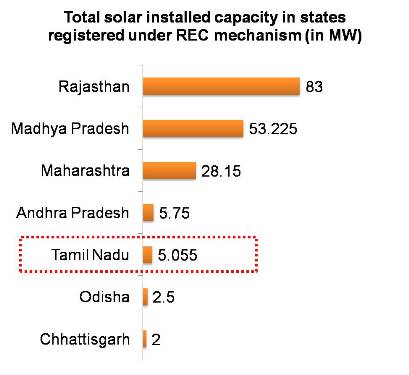Renewable Energy Certificates: India
An introduction to Renewable Energy Certificate (REC) mechanism
National Action Plan on Climate Change (NAPCC) and EA (Energy Act)-2003 provide a roadmap for increasing the share of renewable energy generation capacity in India (Read complete story). To achieve the target set by the EA-2003 and NAPCC, India launched REC mechanism on 18th Nov 2010. The Regulatory framework for REC mechanism has been notified by CERC and the REC mechanism is being supported by MNRE and the Ministry of Power. REC mechanism is a market-based instrument to promote renewable energy and facilitate renewable energy purchase obligations amongst various stakeholders.
Renewable Energy sources are not evenly spread across different parts of the country e.g. Tamil Nadu has great wind energy potential but the state of Uttarakhand doesn’t have the same potential. Hence, problem begins with the unavailability of renewable energy resources in certain RE deficient states. To overcome this uncertainty, the State Electricity Regulatory Commissions (SERC) under the EA-2003, set targets for distribution companies of respective states to purchase certain percentage of their total power requirement from renewable energy sources. This target is referred to as ‘Renewable Portfolio Standard’ (RPS) or Renewable Purchase Specification (RPS) or ‘Renewable Purchase Obligation’ (RPO).
Renewable Energy Certificates (REC)
Renewable Energy Certificates (RECs) are a type of environmental commodity intended to provide an economic incentive for electricity generation from renewable energy sources. One REC is created when one megawatt hour of electricity is generated from an eligible renewable energy resource. REC represents the environmental attribute associate with unit of power produced. States where RE potential is high, there are avenues for harnessing the RE potential beyond the RPO level fixed by the SERCs. Therefore RE deficient states can buy REC’s from these states to fulfil their RPO’s. REC mechanism allows the eligible entities (RE generators) to sale their electricity at local tariffs of the DISCOM and sale their REC’s (Environmental attributes associate with the one MWh of power produced) to the obligated entities.
 By implementing REC mechanism successfully, It is also expected to encourage the RE capacity addition in the States where there is potential for RE generation as the REC framework seeks to create a national level market for such generators to recover their cost.
By implementing REC mechanism successfully, It is also expected to encourage the RE capacity addition in the States where there is potential for RE generation as the REC framework seeks to create a national level market for such generators to recover their cost.
Central Electricity Regulatory Commission (CERC) has notified Regulation on Renewable Energy Certificate (REC) in fulfillment of its mandate to promote renewable sources of energy and development of market in electricity. The framework of REC is expected to give push to RE capacity addition in the country.
Eligible Renewable Energy generators
Eligible Renewable Energy Generators: Wind, Solar, Small Hydro (below 25 MW of capacity), Biomass based power generation (including cogeneration), Bio-fuels and Municipal solid waste based power generation projects are eligible to apply for REC. Projects from these sectors if qualify then can accredited as an eligible entity.


